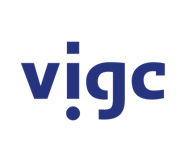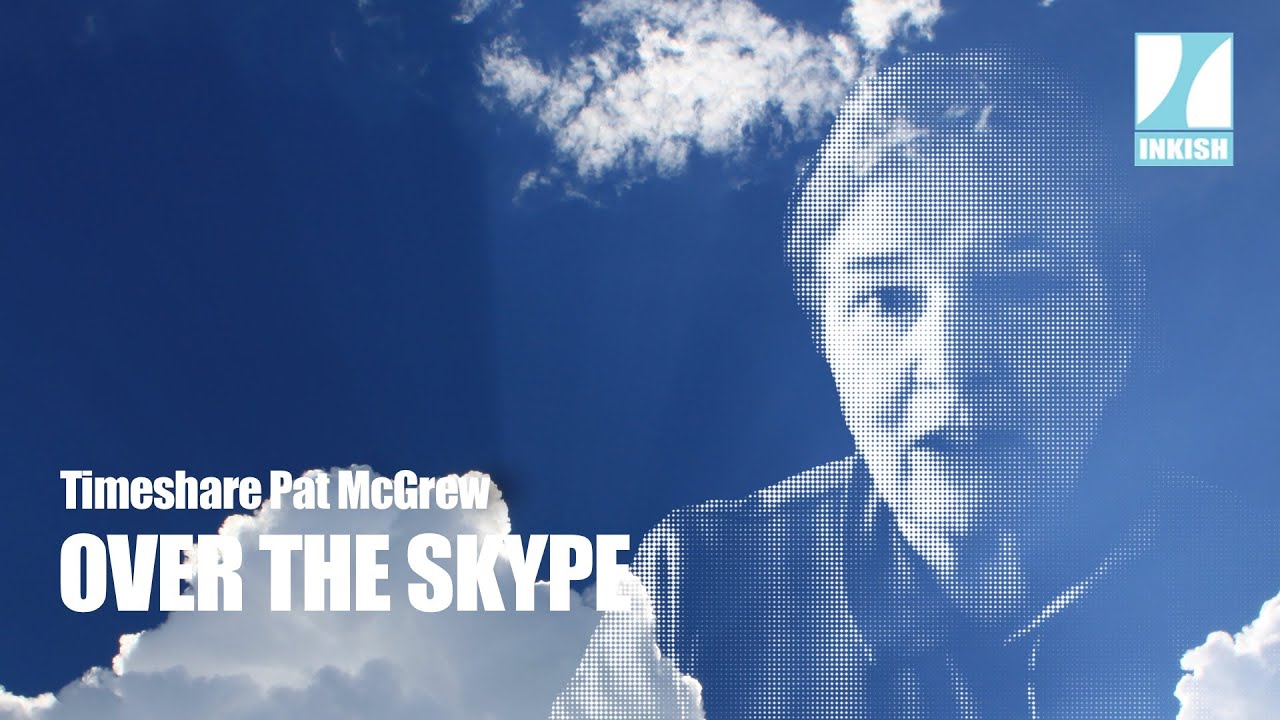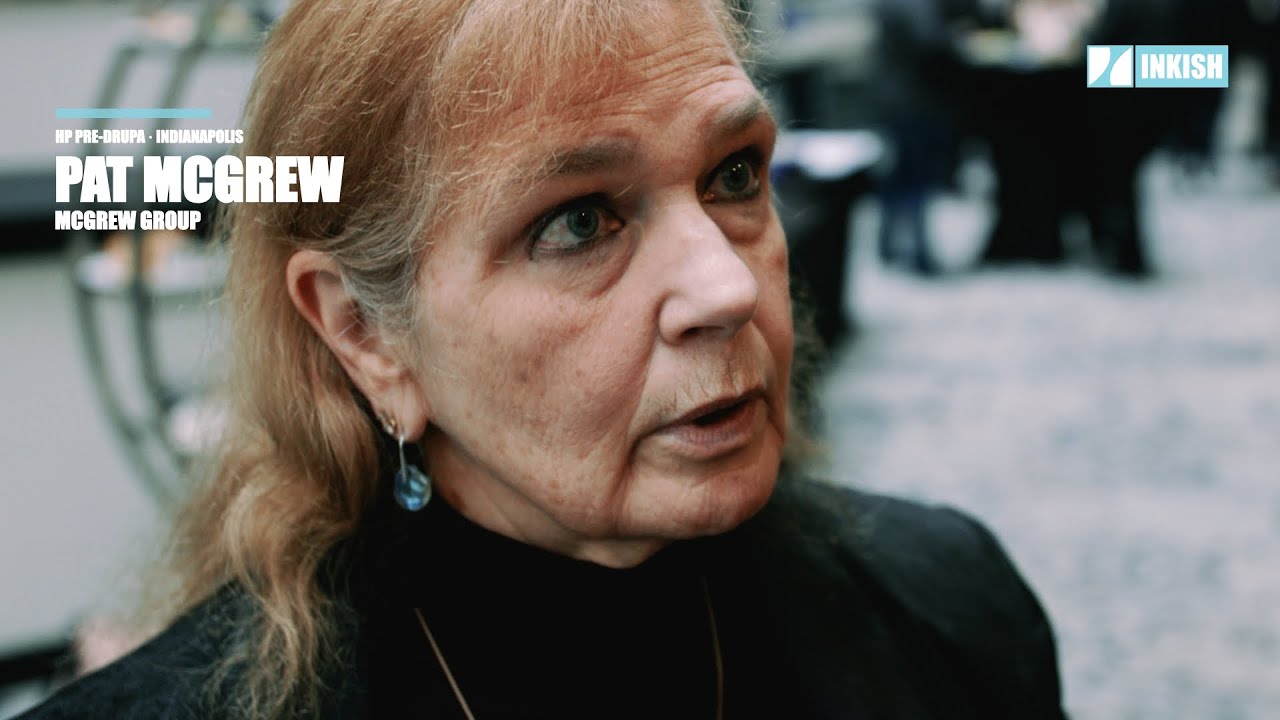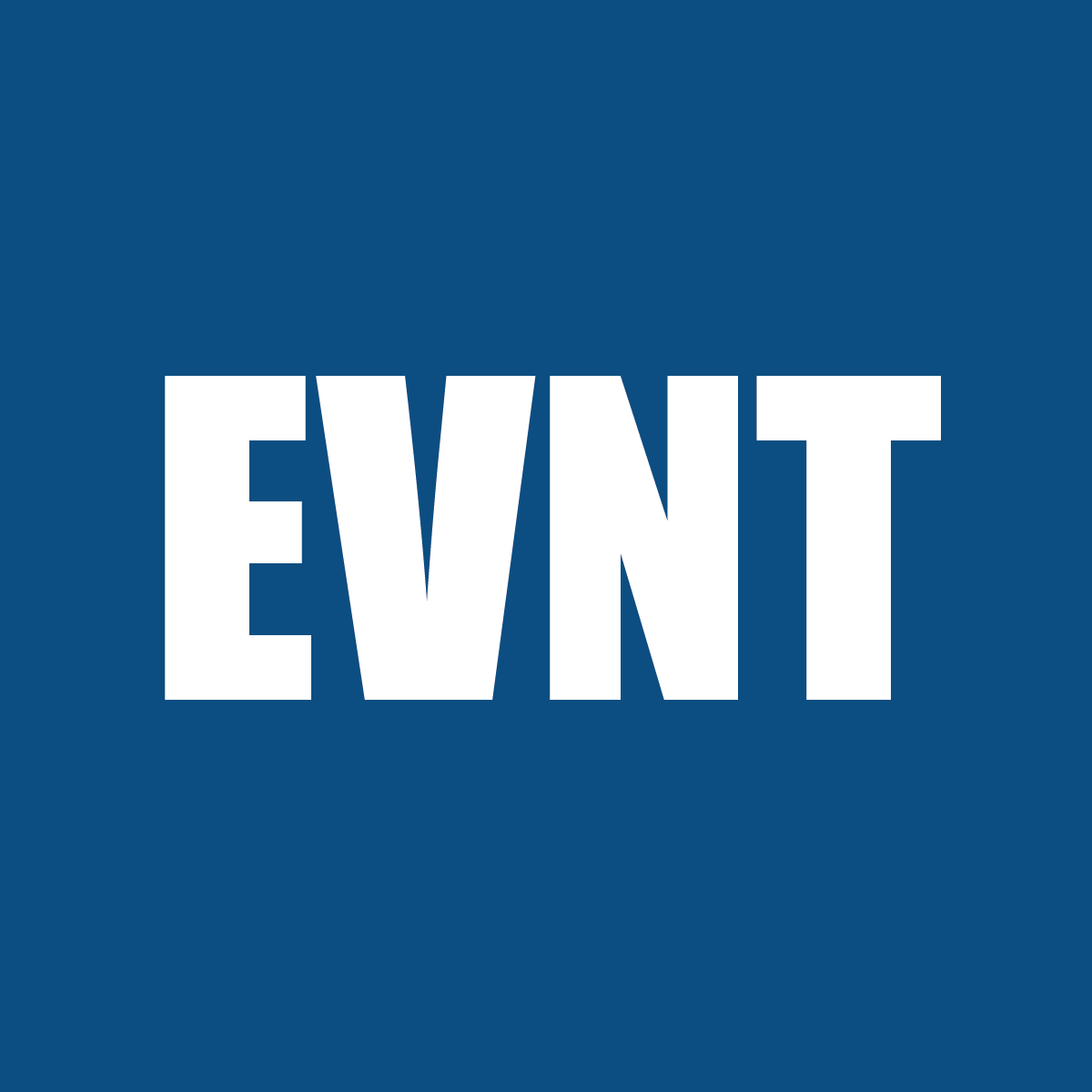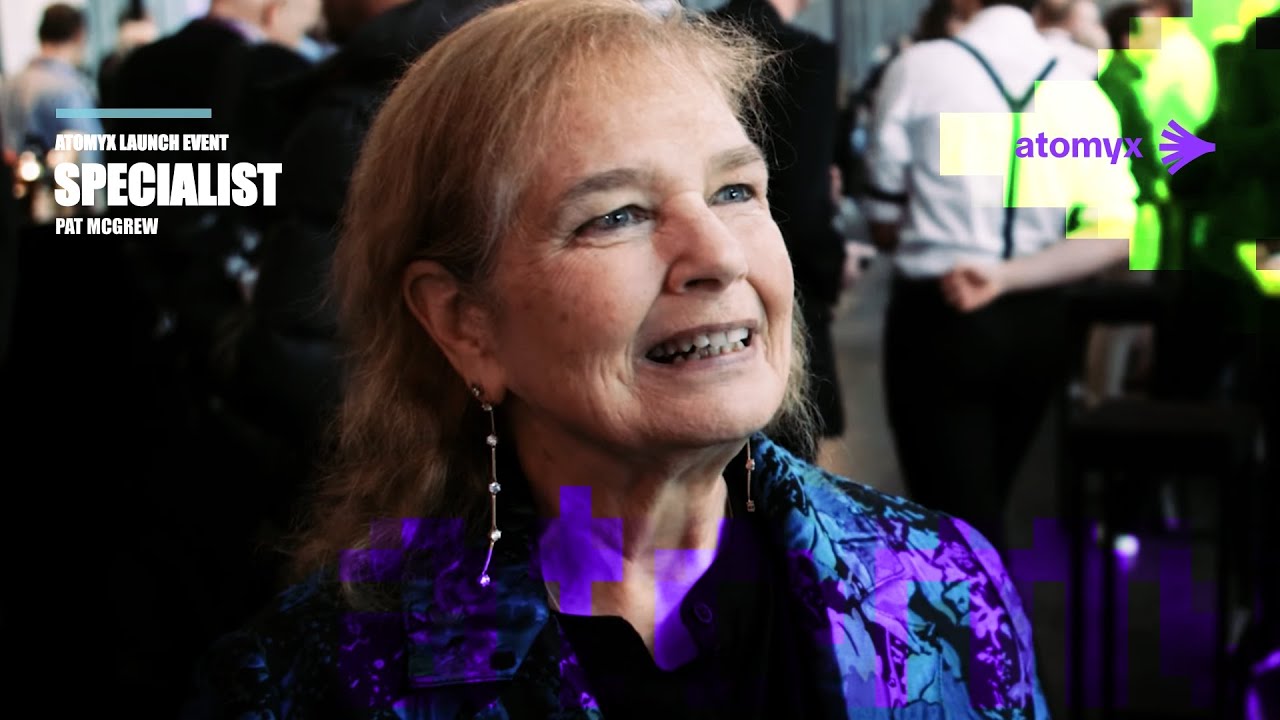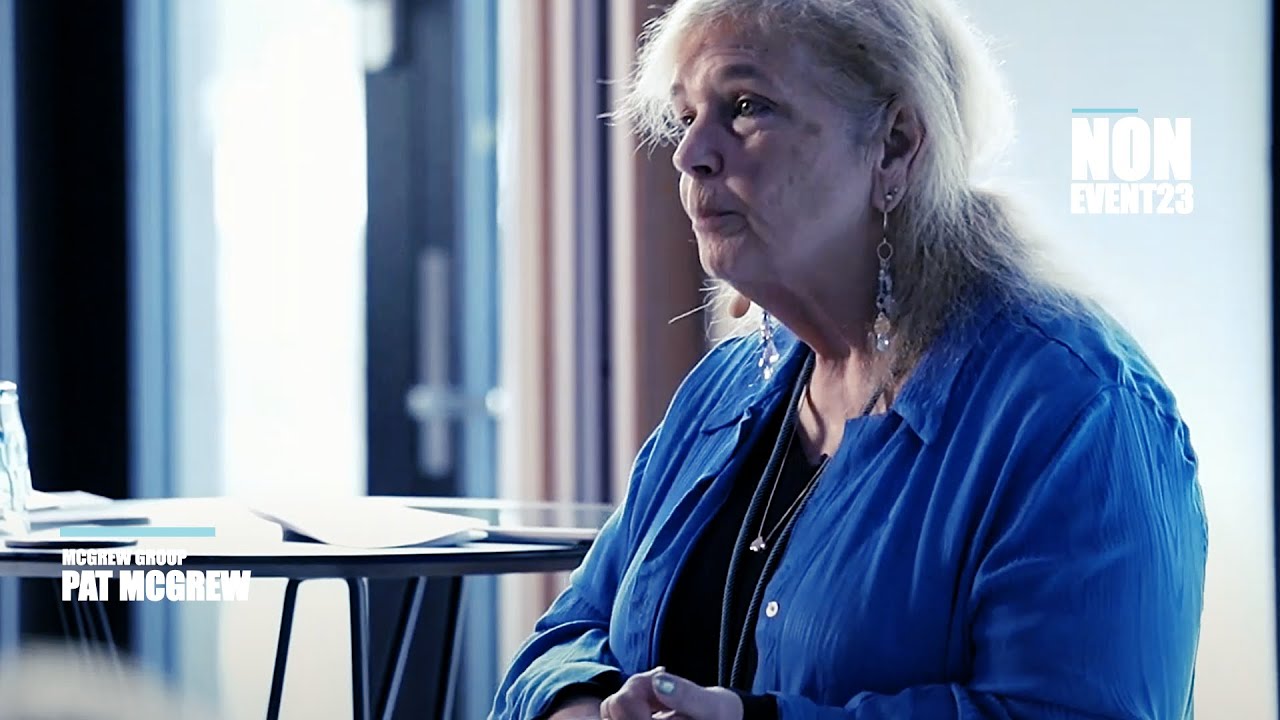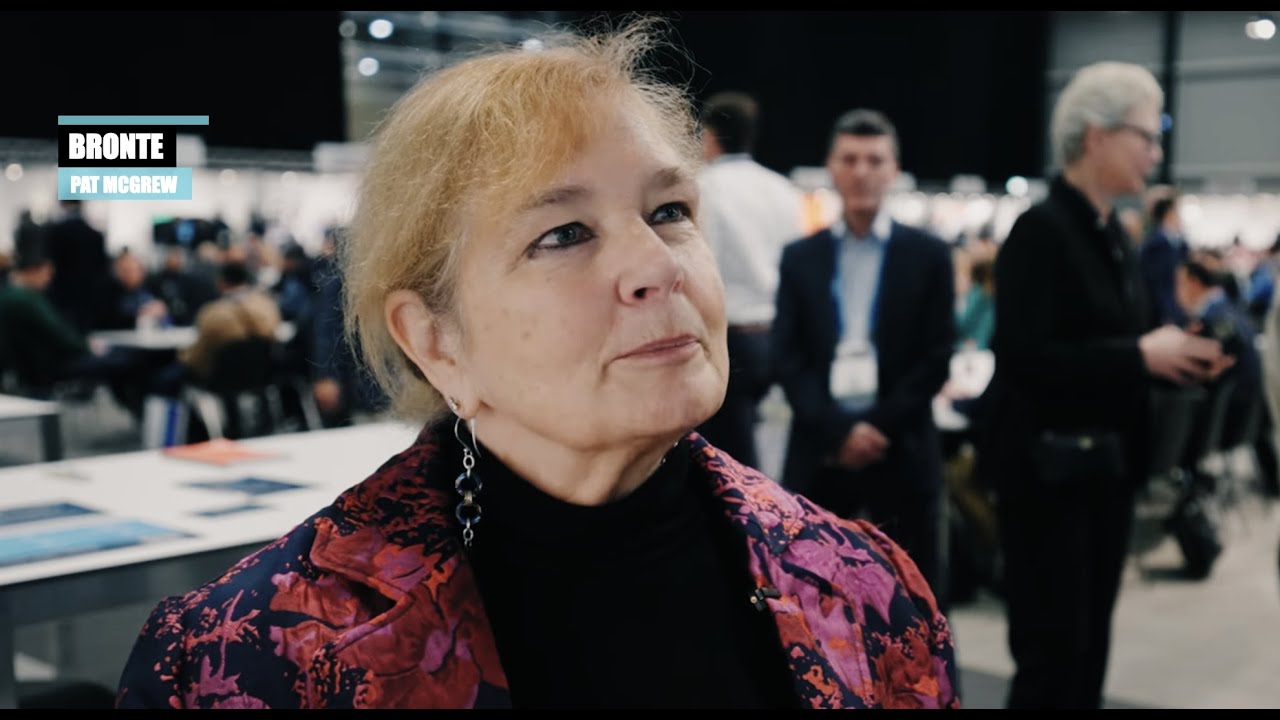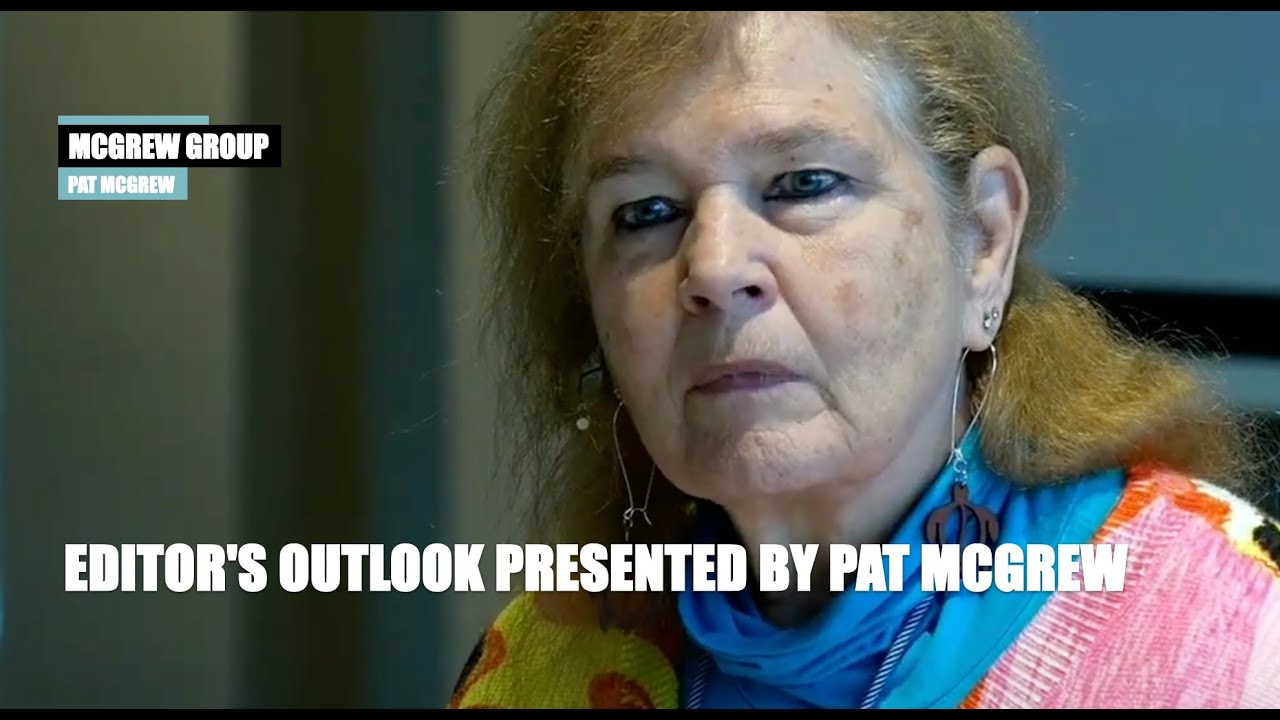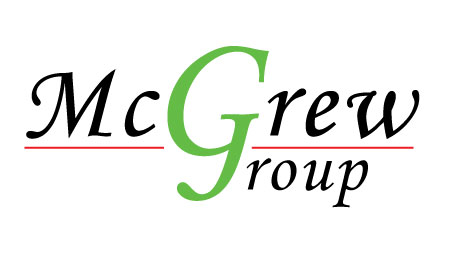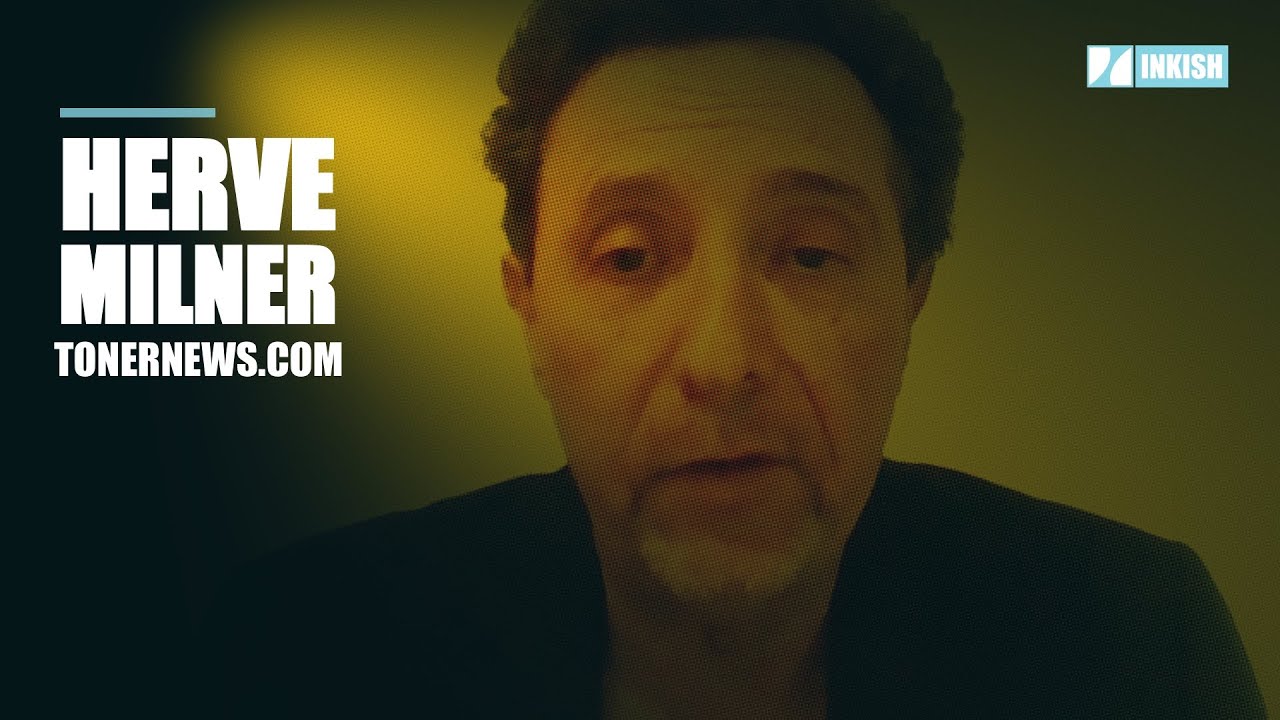Pat McGrew is one of the most experienced people in the printing industry, with a history as the owner of a software company, an analyst with Keypoint Intelligence/infotrends, and also with HP, among others. Now she is on her own, but offer her services in convenient packages. Introducing timeshare Pat McGrew.
As with all our ‘Over the Skype’ interviews, quality is limited to bandwidth, web-cams, and ability to literally LIVE mix the conversations. However, it works, and with Over the Skype, we will bring you more than 20 exciting people, and angles on the industry as it is right now.
Enjoy!
Don’t forget to read Pat McGrew’s article on NEWS about her view on working with analyst companies.
Dear INKISH viewer, this is your editor, Morten Reitoft from INKISH.TV, and if I look a bit tired now it’s probably because I done almost 15 interviews the past few days. So we are busy getting information out to you and as you know, due to the corona crisis, this is recorded from a home, and in the other end of the world, and more precisely in Colorado, I have my very, very dear friend, Pat McGrew, as a guest today. So welcome on board Pat.
Oh thank you. It’s always a delight to be able to talk to you even if it has to be over the airwaves.
It’s funny, because I have known you for some years now and we do business together with a Print Sample TV. And, as I also said to you, and I even announced that public, you are my go to when I have strange ideas I want to challenge. So, I think we know each other quite well. And when we go to trade shows it’s always, “Hi Pat, Hi Morten,” because we’re so busy. And the last time we had a very good time to talk. That was at our non event in Copenhagen in December. So that was… I really appreciated that you took the time to get there. So thank you for that.
It was my favorite event of 2019. Now, Labelexpo was absolutely brilliant. The Danish Sign & Print expo, that was fabulous as well. Everything we did together in 2019 was fabulous, but that non event at the end of the year was a chance for everybody to just take a deep breath and share a lot of really good stories.
And that is what we do here, right? Share good stories. So Pat, you are well known in the printing industry. You have been, way back, you had your own a software company, and you were working with HP, you were working with Keypoint Intelligence, and recently you announced that you are not just the Pat McGrew, you’re the Timeshare Pat McGrew. Before we talk about the Timeshare Pat, what is the story? What happened with the Keypoint Intelligence and where are you now?
So a lot of companies go through changes. Keypoint Intelligence is a company that it was the second time I worked for them. First time I worked for them, it was when they were as InfoTrends. Right as I came to join the company, they had combined InfoTrends and another company together to make Keypoint Intelligence. And after four years of operating in that mode, the organization decided to do some shifting. And part of that shifting did not involve many of the senior analysts. And so, we were thanked for our service and shown the door. So, one Wednesday morning, all of a sudden I’m sitting there going, “Okay, well what do we do next?” And many good friends reached out and said, “Oh well, there’s this job or this job.”
And I looked at everything and it seemed like the most reasonable thing to do was to go back to McGrewGroup, which I’ve had for 25 years, and I’ve used it as a publishing company and it’s been a solutions company. I always had some side things going, but it seemed like it was time to be serious about it, and actually start to try and build it. And as I was sort of brainstorming on that Wednesday morning with my third cup of coffee, what seems reasonable was all the people I work with, who I love working with, all needed different things, you know? Some companies need help with their strategy, some companies need help with content.
I’m just interrupting you, because I want to hear about Timeshare Pat in second because you’re already taking that approach now.
Oh sorry. Yeah, yeah.
And I like that too, but just to… We rewind a little bit, because working in a company like Keypoint Intelligence, and being a senior analyst, that is a job where you meet a lot of people and you have accumulated a lot of knowledge all these years, and you become like one of the most senior specialists when it comes to workflow, and to that kind of thing. Before we go into what you can offer, and what you do, I’m curious about, isn’t it kind of a vacuum to come from being in the, I was about to say, in the sweet spot of knowledge, to suddenly being maybe not needed in the same way, at least from Key Point Intelligence perspective.
So, the funny thing is though, at Keypoint Intelligence, my job description never really existed. Oddly at HP, my job description never existed and neither a Kodak, nor it at Pitney. It’s just sort of common in my life.
But you know why? It’s because you can accumulate a lot of different roles, right?
I’m pretty broad, and so I actually went into Keypoint Intelligence to rebuild the workflow service, and we did that very successfully. We created some new talk tracks, some new products, some new thought leadership in workflow and I’m very, very proud of that work. And Ryan McCabe, who was my partner in crime through all of that, I think we did great work. Over time though I ended up taking on responsibility for customer communication management. It’s an area I’ve worked in before. I worked on working with another analyst to rebuild that. I managed the business development service, and the sales training service. And at the same time I was also sort of the local Inkjet expert, right? Because for 10 years previously, 12 years previously, I had been working in high speed Inkjet, and that was true across transactioning commercial, and a direct mail marketing, mass customization, textile, packaging, whatever you can do with Inkjet. I did a lot of things at Keypoint.
Yeah. So basically what you’re saying is that during the time of both Keypoint Intelligence and also in the career that, up until now, you have got a lot of knowledge from so many different business areas that there might be a very good reason why you don’t have a very distinct job description, because you’re capable of doing a lot of things, and that-
People kept discovering I could do new things. So it’s like, “Oh, you can do that too.”
And I guess that, also, you’re very fast at adapting to new things because that’s how I got to know you is that you are very, very, very good at what you do. And that reverts me to the question. So being in a position where, because I mean in these days with the coronavirus, there’s a lot of people that are being laid off, both in America and in Europe. And I was just thinking that that emotional thing, how does that influence one when you are not needed anymore?
Well, so what I found is that I’m needed more now than I was before. So, when you work for a company like Keypoint, access to you is gated by the organization, right? So you don’t control who you talk to. It’s who they bring to you and what projects they bring to you, right? The thing is that you wind up building relationships with a lot of people over those years, just as I did at HP and at Kodak and at Pitney. And so on the outside of Keypoint, as as McGrewGroup, I still have all those relationships. And all of those people that I can reach out and ask a question to, or who can ask me a question, I have access to a much broader range of research than I did at Keypoint Intelligence. Because when you work for a market research company, you’re sort of obligated to use their approach to market research, which might not have been mine.
So you would say that you had never really experienced that you were not needed. You have seen it as an opportunity to actually broaden your field of expertise, and even talking to clients that maybe wanted you to have a broader approach than just the Keypoint Intelligence way. Is that how I should understand this?
A couple of the contracts that I picked up, literally the same day that I left Keypoint, were with companies that said to me, “Well, we want you. We wanted you to do this project, but we didn’t want to pay you through another entity.” And I appreciated that.
But that is fantastic because that basically questions the… And to some extent, it maybe questions the value of these organizations that have their strict ways of doing things.
I can’t disagree with you. In fact, we wrote a little bit about that in an article. The thing about, I think a lot of these market research companies, and each one has a different methodology to be fair, but I think that they get so intent on promoting things in their way, that it’s harder for them to recognize that they have a lot of talented people working for them. At Keypoint I was part of… I mean, it was like working with the A-Team. There was some great knowledge there, but if it could only be channeled to projects that were paid for.
Yeah, I’m glad that you mentioned the article, because the reason why I didn’t publish it yet was mainly because I wanted it to be aligned with both the time, not the time just between you and me, but also the time in the market right now. Because I think it’s a brilliant article that you’ve written, and it will be published during the Easter here. And that is great because it actually follows a quite good up on what you’re saying right now. So just to conclude a little bit on what we had been talking about so far, is that basically that you have experienced that there is an even bigger interest in your services, and what you’re capable of offering than before. And instead of being employed by another research company or as working for whatever, HP again or whatever, then you have experienced that working with multiple companies through the McGrewGroup will actually benefit, not only you, but also the customers you have. And then you announced shortly after you got… Shortly after you left the Keypoint Intelligence, I really like that title, The Timeshare Pat.
It’s working out well. It really is because I think people got it immediately. I mean, who doesn’t know what a timeshare is, right? You don’t get to own it, but you get to enjoy it for certain periods of time. And it just, it took off. It became a hashtag, as one does, right? I love being a hashtag. But I think people immediately got that, “Well, wait a minute, we don’t have to hire you for 40 hours a week. We don’t have to pay you a salary. We can buy you in increments, and you can help us with this project, or this strategy, or this workshop, and leverage everything that you know, to help us. But pay as you go.”
And that actually is working for me quite well, because it’s allowing me to do diverse projects. So for one company, I’m working with them on a strategy to bring a product from outside the US to the US. Cool. With another company, they have a product that they have been having trouble selling. It’s a print industry product. It should be a killer product, but people are not buying it. So, we are building a strategy to rethink the product. But the other thing that I’m doing there is what I call product triage. We’re looking at the product to see if it’s really doing what it needs to do, and maybe the reason it’s not selling is because it’s missing something. So we’re looking at that.
For another customer, I’m actually creating content. They have a need for a lot of content really fast, because drupa is not happening. They have to do some virtual things that they hadn’t planned on doing. So we’re creating some virtual content. We’re also creating some written content, white… Not really white papers, but information exchanges, if you will, and some customer documentation. I did 20 customer interviews for another customer to help them build a compendium of customer success stories.
Just before you move on, Pat, because that reminds me about a private mail conversation you and I had just when you stopped working at Keypoint Intelligence. And I just like, because I actually acknowledged to you that I’m that old school, because we were talking about the difference between being employed, or being a freelancer. And you changed… Actually, you got me to change my mind, because I thought that, “Okay, you have more loyalty with a person that you have employed, because you have them full time and they can dedicate all the time to a project.” And you actually convinced me that, that it’s actually the opposite, because, if I’m not quoting you wrong, I remember you said, or think you remember, to say that you said that, but if you are a consultant, you’re not worth more than the next job. So therefore, you always have to be more dedicated when you’re freelancing for people in all the projects. And that was like a revelation to me.
And I think for loyalty. I think I have more loyalty to the people who I’m working with on this timeshare basis, because I want them to be successful, because I want them to hire me for the next project. But I also want that their experience, that their customer experience… And you know, we talk a lot in our industry about customer experience, but it applies to me too. I want your customer experience to be the best it can be. Because I want you to say nice things about me in the market. Not, “Oh, we’d never hire that person again because…”
No, that would be a shame.
“… well, they did the job, but you know, this and that and the other thing.” And I think we’ve all worked with people either as consultants or even as employees, that we go, “Oh really? Do I have to?” And I never want someone to say that about me.
No.
So my goal is to be as dedicated to every project as I can be.
Right now it seems that of course the coronavirus time is hard. Also know that you’ve been hit on your restaurant business. And I think that everybody that travels are hit by the coronavirus even more.
Oh yeah.
Yeah. And I was just wondering, because as you said right after you left again KPI, you got contact, and people that reached out because you are a well known person in the industry. So when the natural demand, if you can say that, starts to glide a little bit, how would you mark your services? Is there any services that you are particularly interested in doing?
So a lot of what I do, it’s almost self perpetuating. If I work with you on strategy today, I tell you at the beginning that my contract with you is not for one meeting, right? I set it up so that they go out over a number of months, so that there’s revenue coming out every month. Because those touch points are really important, because strategy is not one meeting.
Damn.
Yeah. Well I know, we all wish it would be. But the other thing is that a lot of what I’m doing, right now, originally started out as getting ready for drupa, and is now getting ready for the not drupa, right? I think we’re all looking at maybe PRINTING United as being… And FESPA maybe as being the next big shows, but for a lot of organizations that we’re intending to do product launches at drupa, we’re deep in strategy. A couple of hardware vendors I’m working with, trying to figure out what to do to get those announcements into the marketplace. Those things will always happen, Morten, because product development, life cycles are constant. It’s always a giant wheel of time, right? And so those needs will always be there. Events, customer events, a lot of my talk track is around doing speaking at live events, or now virtual events. And those things are always happening. A lot of the workshops things that I do around digital transformation and change management, those things are sort of evergreen, because there’s always an organization that needs that help.
But for me, the best thing that I can do is be visible. The best marketing for me is always to be visible. So I’m probably not going to send out direct mail, even though I encourage other people to do it, because what would you send out? Because what I do for each customer is so customized to that customer, but being visible with you, being visible on LinkedIn and Twitter, being visible in print, all of these things are the way that I do marketing for the services that I have to offer.
One of the reasons why I was also asking about it is because, being a specialist, I hope there has been advantages of being in an organization like Keypoint Intelligence as well of course. And I know there are, but I was just thinking that being a workflow and an Inkjet specialist, it requires that you are on top of knowledge all the time. And being at trade shows is one thing, but also being a part of the inner circle of the developers and vendors, and onto the deep NDAs and things like that. Is that something you also can do as a Timeshare Pat? Or is that something that is still left with corporations or larger entities?
It’s actually easier as Timeshare Pat. To be honest, it’s even… I mean, within Keypoint I always had access to the research that the other pieces of the organization were doing, right? So I could talk to the folks who were doing label and packaging, and I could talk to the folks who were doing the on demand service. And I still talk to them, to be honest. They’re all friends. But I couldn’t actually reach out and talk to someone else. So it would be very hard under those circumstances to reach out and have a deep conversation with Marco Boer or Mark Henley at IT Strategies, or to reach out to the guys at Mapa Research, or at IDC, right? Even though I have huge respect, and I read them all the time, I couldn’t really have a conversation with them. Well now, I can talk to anybody. So if I have a client who’s looking for some specific thing, I know exactly who to go to, because of those relationships.
And that’s why you mentioned that the freedom that you have now as not being part of a larger organization, allows you to do basically what is more right for the customers, rather than it what is right for the analysis companies-
The Keypoint projects, or a specific company project. Yeah, it gives me a lot more freedom to reach out. And even to reach out to people who I may not know well, but I know of, because I read them. I mean, I read as many analyst reports as I can. I try to stay on top of all of those things. And it’s not easy. I mean, there’s a lot of content that comes out every day.
That’s one thing. But one thing I have learned about you is, I think that maybe one of the reasons why I feel that you and I click so well is that we are able to capture quite a lot of content in a quite short of time. So I think that sometimes that gives you the opportunity to absorb, and to give maybe more than some other people might be able to do.
Think about Print Sample TV. One of the things… Print Sample TV used to drive Keypoint Intelligence crazy, because here I was as Pat, and with your help, promoting every vendor, right? We didn’t care who printed it, we didn’t care what the device was. If it was cool, if it is cool, we’re going to do a show about it. And some of those people were not Keypoint clients oddly. And they were going like, “You know, you’re helping so-and-so and you know they’re not paying us.” And I went, “Yeah, they, they aren’t, but this is really cool print.” Right. And if what we’re talking about is promoting the industry and Print Sample TV is about educating and helping printers figure out how to make money, because we all want them to do that. They can’t find new equipment if they’re not making money, right? They can’t find new software if they’re not making money. They need to know what to do. And I ultimately got them to stop bugging me about it, but it took a little while.
Yeah, that’s a very good point. And I think that INKISH is still a small media with a limited reach, compared to the bigger ones, both in America and Europe. But I think that the reason why I’m so happy about our project is that we have exact same objective, as you just described, that we want our content to support growth in industry and a belief that our industry can not only adapt, but can also grow. And I think that Print Sample TV is one of the greater things that we have done on INKISH.TV, together with you. Because I would like to talk about the business and opportunities and I also, I never try to point fingers to somebody, but I try to raise debates for the sake of making our industry better. But what you do with Print Sample TV is that you take the coolest thing, and you put it in perspective to the equipment and that is… I really, really love that approach and I’m really grateful that you are part of our mission, because I think we share so many ideas on this subject.
Right? And Morten, what it takes to do that is understanding what all the different pieces of equipment can do, right? So it takes understanding what this Inkjet Press can do that this Inkjet Press can’t do, what this finishing piece can do, that this finishing piece can’t do. What the differentiators are, right? So when we talk about a piece, a lot of the things we looked at with Yanna, at the Danish show that we did last year, she had this massive display that was… Please go to INKISH.TV and look at this edition of Print Sample TV. Because she had all these origami things and things that were masterfully cut, and folded, and glued. And a lot of people don’t get access to that, right? So if you were sitting in Tacoma, Washington, you might not have access to seeing a lot of these things. And what Print Sample TV lets us do is show possibilities, because then you know what printer anywhere in the world can go, “Ooh, I need to find out how I can do that.” Right?
Definitely, yeah.
So what do they do? They’re going to reach out to the vendors that they work with and they’re going to say, “Hey, I need to do this thing I just saw.” And they want to figure out a way to get there. So, even though it’s not a direct sale, right? It really lifts it.
Yeah. I can tell you that. I think I might have told you before, but the next iteration of our developments in INKISH is to develop a platform that is for print buyers and designers. But basically what we want to do with that channel is that showcasing the print samples from Print Sample TV, but connected to the printers able to actually deliver that thing, with our paper to be. So we have our paper database, and the substrates that is printed on. So when you see something on that new channel, you will be immediately able to figure out what printing equipment, and what printer, and where that printer’s located in order to get that message across. So the next iteration of what we’re working on will be even better to bring that story across that you just talked about in this moment
It’s the most exciting thing in the world too. To watch a printer, watch that little light bulb go off over their head, and they go, “Wait, I can do that.” Right? I mean, and a lot of the writing that I do is around trying to, in a way, to try and convince printers that they can do things they don’t know they can do, right?
That’s true.
And it’s an awful lot of what I write about.
Yeah. Pat, first of all, I’m really happy that you are a part of my team, even though it’s only a Timeshare Pat, but it’s a very important part for my channel. I truly appreciate our friendship, and all the support you have given us through the years. And I hope that with this little, I call it INKISH Over the Skype, is giving you an opportunity to sell more of your services. I know that everybody in the industry is looking for business these days. We need it. We need revenues. We need to get back on a more normal times. So once again, thank you very much.
One other thing I want to say to you, if you don’t mind.
Yeah, I never mind. Just bring it on.
Bring it on. One other thing I want to say to you, if you don’t mind. Sometimes people need stuff they don’t know they need. So I’ve actually created a service to develop a safe database for variable data testing, because one of my clients needed it. So now we’re actually going to try and productize.
Just say that again because I’m not sure I understand what you said. Can you say that in a way that non-English people also will understand what you’re talking about?
Exactly. So let’s say that you have a mass customization project that is going to be variable data, right? So you have to program it. It’s going to look at a database with real names and addresses and things, but you have to test it. And technically, you’re not allowed to share that personal data with any other company, any of your partners. Or maybe the variable data is not working right, and the company that you’re using their software, they’re not allowed to take the database of all the real names. Legally, you’re not allowed to share it, but they need to see what’s happening. So I have a safe database of safe names, and addresses, and currency amounts, and email addresses, and phone numbers that I’ve actually built over the years, that I used for projects I was working on. And it turned out that one of my clients had a need. So we started talking to other printers who said, “Oh yeah, I need that too.” So we’re going to start leveraging the relationships to create a product.
See, Pat is very aware that I am going to teach you something, but I can teach you the better and easier way to sell that product. It’s the Lorem ipsum est for variable data, isn’t it?
Well it is, except it isn’t, because think about it. With Lorem ipsum, what you see is text, right? But for an awful lot of these things, they have to know is it currency that landed in this variable field, or is it a three digit non decimal number? Does it have the right currency marker?
So it’s a kind of am XML database, or XML structure? So you have the labeling as part of the dataset?
Yeah, because you want the right kind data to land. And because for a lot of these guys end to end testing involves testing it against a postal database. The addresses have to be real, or that part of the test will fail.
Okay.
So my addresses is are real.
Now I know why you want more than three restaurants, because if you had 1000 restaurants, you could just test it up against your own restaurant.
My own addresses, yeah. There you go.
Okay. Love you Pat McGrew, and talk to you soon.
Thank you, Morten.
Okay, take care.


